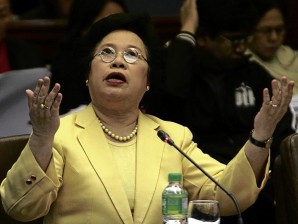Santiago: President’s meetings with senators on Corona trial not a crime

Sen. Miriam Defensor-Santiago. INQUIRER FILE PHOTO
MANILA, Philippines – President Aquino did not commit a crime if he only attempted to influence the outcome of the impeachment trial of then Chief Justice Renato Corona, Senator Miriam Defensor-Santiago said on Tuesday.
Santiago was reacting to Senator Ramon “Bong” Revilla Jr.’s accusation that Aquino had interfered in the impeachment trial when the President allegedly personally told him that Corona should be impeached.
“If President Aquino merely confined himself to attempts to influence the outcome of the impeachment trial last year, he did not commit a crime. But if he bribed the senator-judges to convict the accused, then he is guilty of bribery as prohibited by law and as a ground for his own impeachment under the Constitution,” Santiago said in a statement.
“It is not a crime for the President to try to influence the outcome, because an impeachment trial is both legal and political in nature. It is illegal for the President to try and influence the courts, because of the principle of independence of the judiciary.”
“But it is legal for the President to try and influence the senator-judges, because he is the nominal head of his political party, and within bounds, he has the right to assure his political survival,” Santiago added.
Senator Jose “Jinggoy” Estrada, in a privilege speech last year, claimed that senators who voted to convict Corona received an additional P50 million funds each sourced from the so-called DAP or Development Acceleration Program.
There were also reports, Santiago noted, that three senators – Franklin Drilon, Francis “Chiz” Escudero and Juan Ponce-Enrile— got P100 million each from DAP.
“If evidence shows that Malacañang paid these amounts to the senator-judges as consideration for a guilty verdict, then the crime of bribery has been committed, both by the President and by the senators,” she said.
“Naturally, Senators Jinggoy Estrada and Senator Ramon Revilla, Jr., in their respective privilege speeches, denied that the DAP funds they received were bribes, because the law punishes both the giver and the taker,” she pointed out.
Revilla and Estrada were both charged with plunder at the Office of the Ombudsman for alleged anomalous disbursement of their Priority Development Assistance Fund also known as “pork barrel” funds.
“But the question arises: Why were the three senators who voted to acquit (Corona) not given P50 million or P100 million each?” Santiago asked.
The three senators who voted against Corona’s impeachment were Santiago, Senator Ferdinand “Bong-Bong” Marcos Jr. and former Senator Joker Arroyo.
“Thus, it appears on the record that if the senator voted to convict, he got at least P50 million. But if the senator voted to acquit, he does not get anything. At the very least, this procedure is discriminatory and constitutes a violation of the Equal Protection Clause of the Constitution. It also gives rise to the natural presumption that bribery was intended and consummated,” Santiago said.
She then urged the Supreme Court give priority to petitions concerning the constitutionality of the DAP, “to help settle the burning issue of bribery of an impeachment court.”
If the high tribunal rules that DAP is unconstitutional, then Santiago said, the usual consequence is that the senator-judges will be obliged to restitute and return to the government the additional funds they received
“Furthermore, President Aquino will become liable for impeachment, on the constitutional ground of bribery,” she said.
On whether or not the SC has the power to review a judgment of impeachment and conviction by the Congress, Santiago believes the high tribunal could give due course to a petition for review on certiorari “on the ground of extrinsic fraud, which was committed outside the narratives of the trial.”
She then pointed to conflicting positions of two American authors – Prof. Charles Black, Jr. of Yale University and Prof. Raoul Berger of Harvard University.
Santiago said Black believes that judicial review is not acceptable while Berger wrote that judicial review could be undertaken by the Supreme Court.














